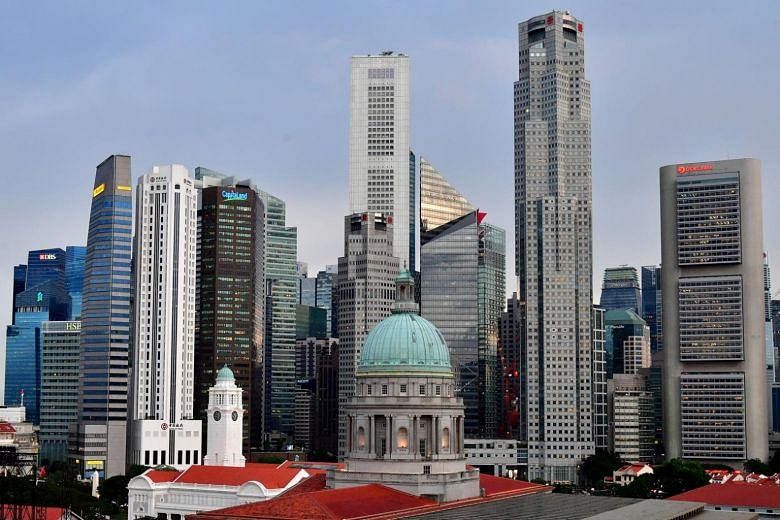SINGAPORE - Singapore has narrowly avoided a technical recession, according to data out on Monday (Oct 14) by the Ministry of Trade and Industry (MTI).
Flash estimates by the ministry showed the Singapore economy grew by 0.1 per cent on a year-on-year basis in the third quarter of 2019, the same pace of growth as in the previous quarter.
On a quarter-on-quarter seasonally adjusted annualised basis, the economy expanded by 0.6 per cent.
This marks a turnaround from the revised 2.7 per cent contraction in the second quarter of the year.
A technical recession refers to two straight quarters of quarter-on-quarter contraction.
However, these figures disappointed analysts polled by Bloomberg, who expected year-on-year gross domestic product growth of 0.2 per cent. They also predicted a 1.2 per cent quarter-on-quarter growth.
Economists said that Singapore's near miss from a technical recession has brought some reason for cheer and may bode well for the fourth quarter of the year, but cautioned that the outlook for growth still remains limited.
CIMB Private Banking economist Song Seng Wun said: "The markets have a bit of relief now that the US-China trade fight is rolled back and not escalated further, although we are not sure how long that relief might last.
"The low base of comparison in the last quarter of 2018 might also help numbers. What we can hope for now is stability at the lower level and that it does not worsen from this point forward, which in itself will give confidence that the worst is over."
Ms Selena Ling, head of treasury research and strategy at OCBC Bank, cautioned that the external environment remains anaemic, even with the recent US-China negotiations.
"The substance of the deal is that the US will delay the first tranche of tariffs, but if Phase 2 and 3 of the deal do not come about, the issues might come back again. The trade war has already lasted for over a year and has been very protracted, with other issues like human rights violations. It suggests that it is still a bumpy road ahead," she said.
She added that the issues facing the global economy are not just related to the trade war. "When we first started out, everyone thought it was just about the US-China trade war, but now there's weakness elsewhere in Europe, Britain and Hong Kong, so it becomes a global slow growth story of broader weakness."

A slight softening in service sector growth numbers also shows that the slowdown is seeping into domestic consciousness, she added.
"What started out as an external, manufacturing, trade-driven weakness is staring to(affect) domestic confidence and consumption. The services sector has a much bigger weight on the Singapore economy and will be a more important determinant of the labour market going forward."
According to MTI's flash data, the manufacturing sector continued to show weakness, contracting by 3.5 per cent on a year-on-year basis in the third quarter. This extends the 3.3 per cent decline in the previous quarter.
The ministry noted: "The contraction was due to output declines in the electronics, precision engineering and transport engineering clusters, which more than offset output expansions in the chemicals, biomedical manufacturing and general manufacturing clusters."
On a quarter-on-quarter seasonally adjusted annualised basis, the manufacturing sector shrank by 0.4 per cent, moderating from the 4.2 per cent contraction in the preceding quarter.
However, the construction sector grew by 2.7 per cent on a year-on-year basis in the third quarter, extending the 2.8 per cent expansion in the previous quarter.
"Growth in the sector was supported by a pick-up in both public and private sector construction activities," the ministry said.
On a quarter-on-quarter seasonally adjusted annualised basis, the sector contracted by 1.1 per cent, a slower pace of decline as compared with the 5.3 per cent contraction in the second quarter.
The services producing industries also expanded, by 0.9 per cent year on year in the third quarter, following the 1.1 per cent growth in the previous quarter.
Growth during the quarter was primarily supported by the finance and insurance sector, the other services industries and the business services sector, the MTI said.
But trade-related services sectors such as wholesale trade were dragged by weak external demand as well as negative spillovers from the downturn in the electronics and precision engineering clusters.
On a quarter-on-quarter seasonally adjusted annualised basis, the services producing industries grew by 0.7 per cent, a reversal from the 1.4 per cent decline in the preceding quarter.
Mr Song noted that these numbers give reasons for hope, with domestic-oriented industries getting a lift from financial services, hospitality and information and communications technology-related services like data protection.
Visitor arrival numbers to Singapore have also been encouraging, with spillover from the Korean-Japan squabble and Hong Kong protests, he added.
Government spending on construction projects has also helped the sector to grow after earlier periods of contraction last year.
"These are pockets of optimism against the current backdrop where the expectation is still that US and China are far from a resolution, although the fight has not escalated," he said.


